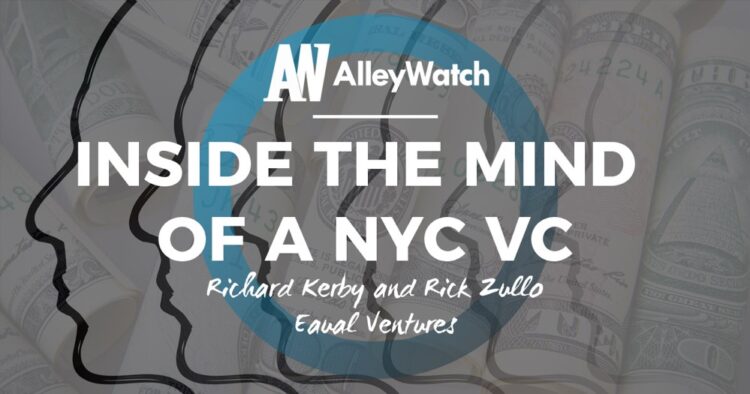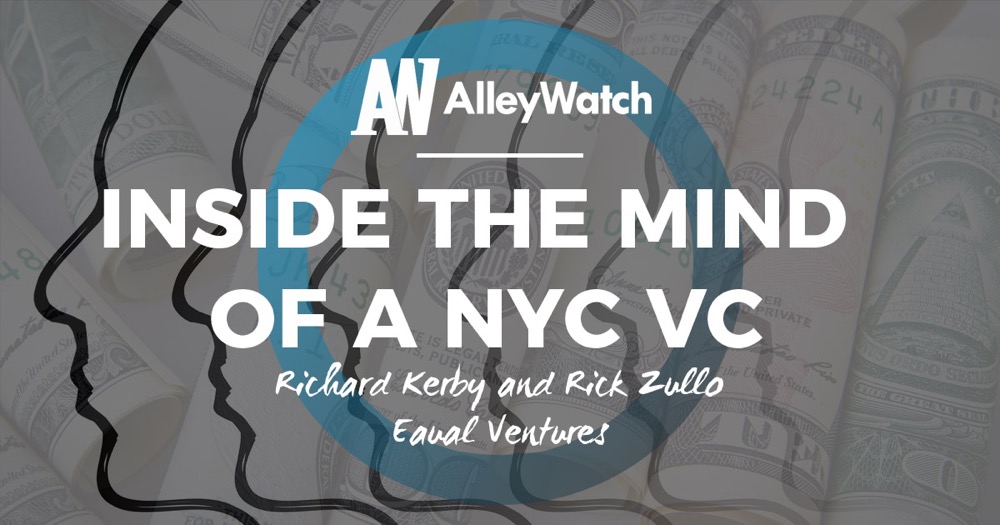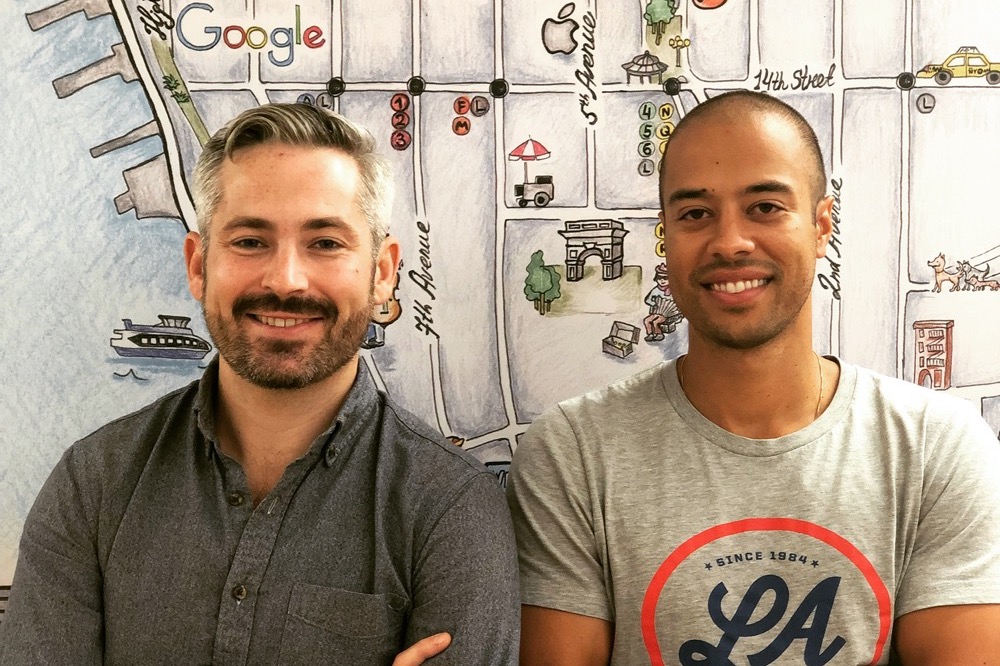Welcome back to Inside the Mind of an NYC VC, a highly acclaimed series at AlleyWatch in which we speak with leading New York City-based Venture Capitalists. Today we sit down with Richard Kerby and Rick Zullo, General Partners at Equal Ventures, the early-stage venture firm, investing out of its inaugural $56M fund that closed earlier this year. Richard and Rick are seasoned venture investors, having spent time at Institutional Venture Partners, Venrock, Lightbank, Bowery Capital, and Foundation Capital prior to launching Equal in 2019. The portfolio includes names like Block Renovation, Gerry, Pattern, and Watchtower.
Richard and Rick were kind enough to join us in our offices in Soho (pre-lockdown) to provide some candid insight into their respective paths to venture, fundraising as first-time fund managers, Equal Ventures’ conviction-driven thesis, Taco Bell, and much, much more…
If you are a NYC-based VC interested in participating in this series, please send us an email. We’d love to chat. If you are interested in featuring your brand in this series that showcases the leading minds in venture in NYC, we’d also love to chat. Send us a note.
Reza Chowdhury, AlleyWatch: Please tell us a little bit about your backgrounds and how/why you started in venture.
Richard Kerby, Equal Ventures: I graduated from Georgetown University. My first job after college was as an Investment Banker at Credit Suisse. My first foray into venture capital was with IVP (Institutional Venture Partners), a later stage firm based in the Bay Area. While at IVP, I got the itch to move earlier stage and joined Venrock, where I spent nearly the next five years of my career. And finally, Rick and I started Equal because we thought there was a void at the seed stage that we were uniquely positioned to solve.
Rick Zullo, Equal Ventures: I spent the first 5 years of my career as a strategy consultant at Deloitte Consulting, before joining a private equity fund focused on technology investments, called Lightview Capital. I decided to get my MBA at Columbia Business School and ended up getting the chance to do some consulting work with First Round Capital’s portfolio while I was there. From there on out, I knew I wanted to be in venture and was able to get internships with Bowery Capital and Foundation Capital, before joining Lightbank, a $200m early-stage venture fund based in Chicago, where I spent the next 4 years after graduation. For me, I got into venture for the chance to help amazing founders solve incredibly impactful challenges. That’s at the very core of what we do at Equal and we’re fortunate to work with a group of founders that I truly admire.
How did both of you come together and decide to launch your own fund?
We originally met ~6 years ago via an intro through a mutual friend in the VC industry. From that original meeting, we stayed in touch and spent the subsequent years discussing investment themes and opportunities, and eventually, we felt that we were prepared to embark on our own to test out our thesis for what is now Equal.
As first-time fund managers, what was the fundraising process like for Equal? What factors about the fund do you believe led your limited partners to invest?
The fundraising process for any first-time fund manager is quite difficult and we were no exception. We were fortunate to bring successful track records to the process, and it still was incredibly difficult. I believe we met with over 200 potential LPs, but as we started investing our LPs got the chance to see our thesis play out and to see the success of some of those early investments. Getting those early LPs was the toughest part, but we’re fortunate to have some incredible LPs who believed in the strategy and believed in us.
The fundraising process for any first-time fund manager is quite difficult and we were no exception. We were fortunate to bring successful track records to the process, and it still was incredibly difficult. I believe we met with over 200 potential LPs, but as we started investing our LPs got the chance to see our thesis play out and to see the success of some of those early investments. Getting those early LPs was the toughest part, but we’re fortunate to have some incredible LPs who believed in the strategy and believed in us.
How has investing at your own firm differed than investing while working at a venture firm?
The biggest difference for us has been the dramatic reduction of stakeholders to convince to make an investment. We are a lean team of two GPs and that enables us to make decisions in a more streamlined fashion.
What have you learned since launching? Tell us about the experience of building a VC brand. What mistakes did you make early on?
One thing that we have learned is that more resources are always a positive. To that end, we are looking to hire a Pre-MBA Associate.
Is there a specific investment thesis that Equal Ventures deploys? Where is the firm’s sweet spot?
We focus on leading and co-leading seed rounds. Our average investment is $1.5M in rounds of $2M – $4M. We are targeting 4 – 6 new investments per year and we are looking to invest across North America.
Why do you think a thesis-driven approach for seed investing will return more over time versus the roulette/over-diversification approach that has been popular as of late?
We believe that there are many ways to succeed in venture, but think that being thesis-driven is incredibly important given the sectors we invest in. We believe a “prepared mind” helps us drive conviction behind investments at the earliest stages and that developing authentic relationships with industry experts in the sector enables us to be even more helpful to our companies.
We believe that there are many ways to succeed in venture, but think that being thesis-driven is incredibly important given the sectors we invest in. We believe a “prepared mind” helps us drive conviction behind investments at the earliest stages and that developing authentic relationships with industry experts in the sector enables us to be even more helpful to our companies.
The firm has an incubation arm. Please tell us about that. What role will incubation play going forward in the firm’s overall strategy?
Incubation is a feature of our strategy, not the focus. We are investors first and foremost, and only decide to go down the path of incubation after we have landscaped the existing startup landscape, are unable to find the opportunity in the market and feel that we have a team that is so uniquely positioned to execute on the opportunity that we would have invested in the deal in ourselves had it come in as a new pitch.
Both are you from the New York metro area but you’re sometimes looking at opportunities that are outside of the area. Why?
New York is the industry capital of the world. While the businesses we work with are everywhere, the industries they work in all flow through New York. We are happy to go and find and support founders wherever they are based, but believe that our team being in New York is a huge advantage for our strategy.
What are you excited about right now, from an investment standpoint?
We are interested in chatting with any founder that is tackling a legacy market. We define a legacy market as a category that has yet to become tech-enabled. A few examples of those categories include retail, logistics, insurance, and the care economy.
The firm is able and willing to write larger check sizes for companies than typical seed-stage investors. What are the things you look for to gain this conviction both qualitatively and quantitatively?
We are always looking for founder-market fit. We are trying to understand why the founding team is uniquely qualified to build this business. We generally find that founders are best positioned to build their business if they have spent a significant portion of their careers in the market they are attacking or if they have had personal experiences that have given them a passion for the problem that they are looking to solve.
Related to this, from a portfolio construction standpoint, some may consider this approach riskier at the early stage. How does the diligence process differ to mitigate this risk?
We focus a lot of our diligence process on making sure that we have a clear understanding of the market so that we can understand the risks we are taking that may be out of the founding team’s control and how the team will need help, and ultimately how we can be most helpful. Even if an opportunity is pre-revenue, our network in those industries enables us to get a sense of customer demand and determine how impactful the company can be to the industry in the years to come.
We focus a lot of our diligence process on making sure that we have a clear understanding of the market so that we can understand the risks we are taking that may be out of the founding team’s control and how the team will need help, and ultimately how we can be most helpful. Even if an opportunity is pre-revenue, our network in those industries enables us to get a sense of customer demand and determine how impactful the company can be to the industry in the years to come.
What is one thing that many founders are missing, not emphasizing enough, or not aware of when pitching?
One thing that we often find lacking in a pitch is a clear understanding of what needs to be achieved to demonstrate product-market fit. We are always looking to understand what are the hypotheses that the founders are hoping to prove out with this fundraise to demonstrate product-market fit.
As the New York tech ecosystem has evolved over the last few years, access to capital has improved for founders but not all capital is the same. What should entrepreneurs be looking for in an investor?
Founders should be looking to partner with investors who can demonstrate the ability to be the most helpful for their business. You should be able to see signs of this during the investor’s diligence process and it is important to ask investors for references so you can hear directly from other founders how they work with entrepreneurs.
Finish this sentence – in 10 years, the NYC Startup ecosystem will be…
a focus for every venture investor across the country.
Will coronavirus have an effect on the startup world and if so, how do you envision this panning out for companies in your portfolio?
We do believe that Coronavirus will have an impact on the startup world. In the near-term, it will definitely have a negative impact on the majority of startups’ projections. In the mid-term, it will probably make fundraising for all startups more challenging. In the long-term, we will most likely see more startups working remotely as a standard practice rather than only during a crisis.
What’s the favorite restaurant for the Equal Ventures team for outings in the city?
Taco Bell – Our first “official” holiday luncheon was at the one on our block.
How does the Equal Ventures team celebrate wins?
We don’t generally have big celebrations, a champagne toast is our standard celebratory practice.





